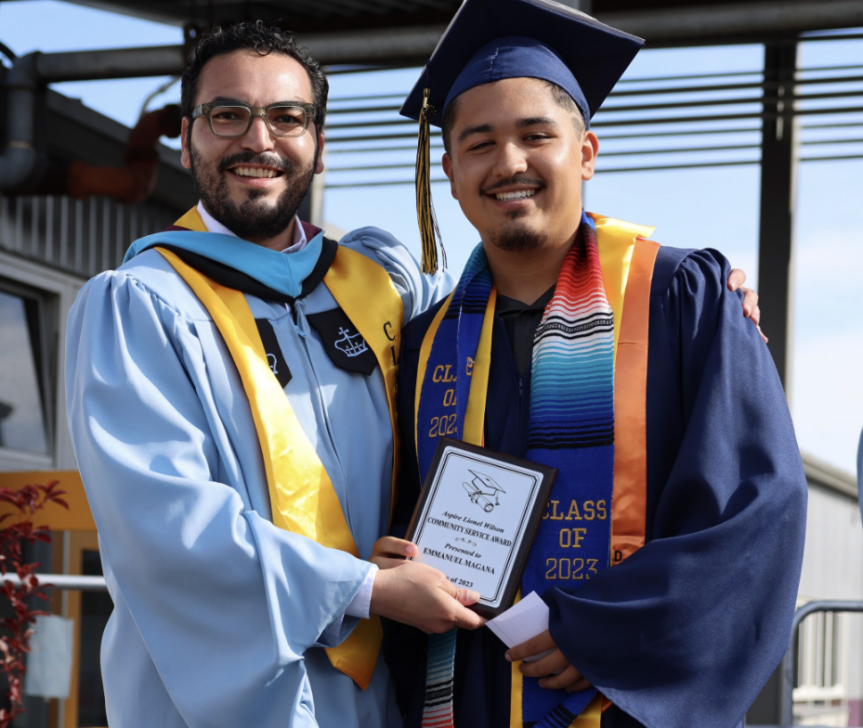The Oakland Raise the Bar Awards on Thursday, March 28 celebrates schools making exceptional achievement or growth possible for Black and Brown students in A-G, ELA or Math. (You can RSVP here.)
Great School Voices sat down with school leaders from award-winning schools to discuss what Raising the Bar means to their school community, why their school got involved in FIA, how they communicate with families, and more. This interview is with Tommy Gonzalez, Aspire Lionel Wilson Prep school principal. Click on the video below to watch the full interview, and you can also view Tommy’s answer to each question in segments below.
What did it mean to you to raise the bar?
It’s just simply a nonnegotiable, specifically for Black, Brown, and Latinx students here in Oakland. The bar needs to be that of excellence. And so it’s our obligation to our families and our scholars to have that bar raised consistently till we have 100% of our students reading at grade level and performing at math at grade level, too.
What big data did you share with families and students, and how did you communicate that out?
Parents have a right to know where their children are at, period. And so it’s important for us to share the facts of where our students are at and what are we doing to make sure by the time they leave us, they’re prepared for the 21st century and have the skills necessary to compete. It’s just important that they have the facts and the data to also be knowledgeable and to take action at home, too, and to hold us accountable as a school.
What did you recommend to parents to help raise the bar?
I’m in the belief that the education predominantly happens at the school site, and, of course, it extends into the home. And what it means is, through the family meetings, through our SSCs, is providing parents with what we’re doing and how we’re doing it and getting their input into their children’s education. Not only their input, getting the students perspective, because it’s about them, ultimately, and how we educate them.
What feedback did you receive from families?
Well, our families are very honest. What they have demanded since I stepped into the principalship here at Lionel Wilson is the caliber of teaching and learning. And so to that end, we had to double down with our commitment to developing our adults here on campus to make sure we’re providing their students with the high quality education that they want to see here in Oakland.
Why did you get involved with FIA to Raise the Bar?
The reason I got involved with FIA to raise the bar is because too often here in Oakland, the bar for black and brown students has not been there. It’s been non existent, quite frankly. And so it’s important that as a school community, we have that bar set high and so our students can be well positioned once they leave us to pursue the post secondary.
How did you raise the bar?
We raised the bar through restructuring our academic programming and refining our practices. For instance, we looked at our core instructional programming and we needed to use evidence based approaches and that’s what we did. We started in the humanities department and we saw substantial, consistent growth there. And we replicated that model of observations, adult learning, coaching and to other departments. And so now all of our departments benefit from our academic programming and cycle that we have. What else is true? We developed in this past year a college and career center, so our students are now getting wraparound services when it comes to college and career exploration and awareness.
What would you say is the secret sauce that were most impactful to raising the bar?
There is no secret sauce. The secret sauce is just following the evidence based practices and getting folks on board with those practices because it’s well publicized research that’s out there that have been effective. And so I would say the tricky part is the change management and making sure it’s implemented well and controlling for that quality.
What are some of the best practices you’ve instituted to help raise the bar?
Some of those best practices is just making sure when we educate our students, we keep them in mind, because ultimately, it’s about their education. And some of the practices that we have adopted, for instance, is ‘who is doing the cognitive lifting?’ ‘Is it the adult teaching or is it the student?’ ‘And what are ways that we’re setting up a classroom environment to promote deep and hopefully transferable learning for our scholars?’ And so those are the practices we have adopted. In addition to that, we do believe in cross curricular integration. So that is planning with all disciplines in mind because we know that becomes more culturally responsive for our students. In addition to that, there’s a focus here at Lionel Wilson to focus on connections over compliance. So we do heavily rely on our relationships with students to make sure we know who they are.
In what ways can our elected officials, the District, state, and community help you raise the bar?
What we need to do collectively? We still need to work collectively together because the bar for black, brown, latinx students, since I’ve injured education, has remained stagnant, if not, perhaps slightly declined, post COVID. And so we need to double down in our commitment. And what we’re saying and what we’re doing needs to match here in Oakland and beyond, because we still need our black, brown, and Latinx scholars to be the decision makers of tomorrow, because more than ever, we’re a bigger representation of the population in the United States.

